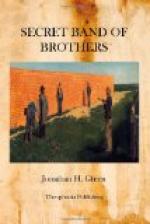Mr. Green admitted that it might be so—that it was so.
Mr. Freeman said that he knew Mr. Green’s friends had a reply to cover all such things—because he was a reformed man—Mr. F. hoped it was so, but he really had some little doubt.
Mr. F. distinguished between deep play, which he likened to the strategie of generals in the field, the one to mislead the other, and open, undisguised cheating, which he denounced. Mr. F. referred to several distinguished men who gambled—and to several well-known gamblers—and he defied Mr. Green to say that any one he had named would or could be guilty of a mean action.
There was in the world a certain amount of wealth—the many of mankind were (the industrious) producers—but he held that all men, speculators, who circumvented others by their wits, living without work, were in point of fact—gamblers. If a man were to go into the street and gain $3000 in a morning by a stock or other speculation—why, as surely as we lived, somebody lost that money—aye, and by gambling on the largest scale. Men who lost their money at a gaming-table went there to win money of the gamblers—but generally lost their own. Their object was to put the gambler’s money in their own pockets; and when they were disappointed, they exclaimed against gamblers. Gamblers lived on the depravity of men; if men were not depraved, gamblers would have no chance; but they were encouraged by the depravity of others. Mr. F. condemned and would punish cheating, whether by gamblers or other speculators.
Mr. Green did not wish to say any thing personally against any of the men or gamblers who had been named by Mr. F. Some were benevolent men—but one or two he had named were men without heart. He (Mr. G.) knew several gamblers, amateurs and professional men, who were straightforward in their gambling transactions. He did not desire to hurt the feelings of any of these individuals—he attacked not men but vice—and he contended that gambling was a system of robbery, from beginning to end. That it was that he contended for—and that, he hoped, he had already shown. Mr. Green admitted that Mr. Freeman’s story of the scheme gotten up, bowie-knife, &c., was in the main correct. If meeting contracts was honest—why then, many gamblers might be called honest. He did not mean to say that such HONEST gamblers would put their hands in a man’s pocket and steal money—no—they would not do that.
But he would say what they would do;—they would sit up all night, have suppers, wine and spirits set out to tempt men, and they would play with any that came; and though some such customers were known or suspected to have obtained the money they played with by robbery, yet he never knew that the gamblers had ever refused to allow such men to play, so long as they had money. Mr. Green described several snares that were practised by gamblers, particularly one at New Orleans, called the “broker.” He hoped some of the gamblers of this city would reform as soon as the new law went into effect. He had already heard of some having turned collectors, policemen, &c.—but he doubted their reform if they were turned over to the police—for though there were some very good policemen in this city, he could confidently say also there were some spotted ones.




